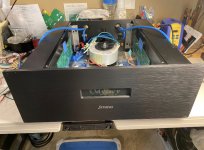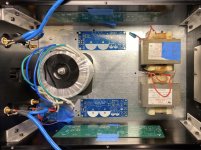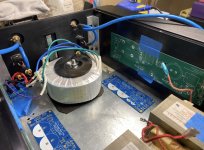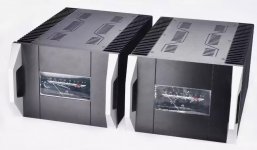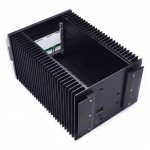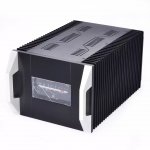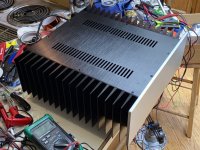The LSJ74 is rated @ 25V Min, so borderline safe without cascodes, otherwise simple.Can someone please look into the possibility to run ACP+ at 55v rail with reduced bias current?
Over in ACP+ thread, Mark Johnson said that the Dreadnought FE board can do 53vpp. So there are options out there for preamps to drive the LuFo for sure. Here was the Dreadnought Oscope screen shot at 53.4Vpp:
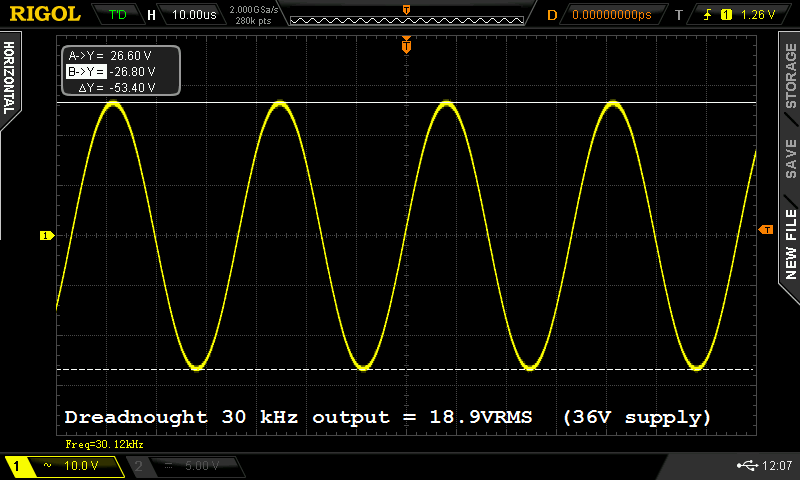
Dreadnought appears similar to a Blameless architecture?
Dreadnought appears similar to a Blameless architecture?
I built a BA3 preamp for a golden ear friend of mine who is too old to solder and assemble equipment. He absolutely loves the BA3 preamp. I am going to assemble Botte's ccfb to drive my LuFo.
I have the key components (PCBs, Mosfets, tubes) for a Borbely hybrid line amp:
https://www.pearl-hifi.com/06_Lit_A..._Amps.pdf#[{"num":38,"gen":0},{"name":"Fit"}]
Can be configured for >30dB of gain so looks like a good candidate to drive a LuFo (or similar power buffer). There seems to be an aptness about using a line amp with obsolete Mosfets to drive a power buffer based on obsolete output devices (such as the LU1014D, Tokin SITs, etc).
https://www.pearl-hifi.com/06_Lit_A..._Amps.pdf#[{"num":38,"gen":0},{"name":"Fit"}]
Can be configured for >30dB of gain so looks like a good candidate to drive a LuFo (or similar power buffer). There seems to be an aptness about using a line amp with obsolete Mosfets to drive a power buffer based on obsolete output devices (such as the LU1014D, Tokin SITs, etc).
I would imagine that the harmonic profile of the Dreadnought (being similar to a Blameless topology) might have the 2nd and 3rd order distortions closer together in level, and perhaps more higher orders present. Whereas the Aksa Lender was designed to be second order dominant, with monotonically descending higher orders, and few higher orders presemt. In my HOWTO thread on distortion measurements using REW, I used the Aksa Lender as an example of what an FFT can look like driving 20Vpp into 7kohms:
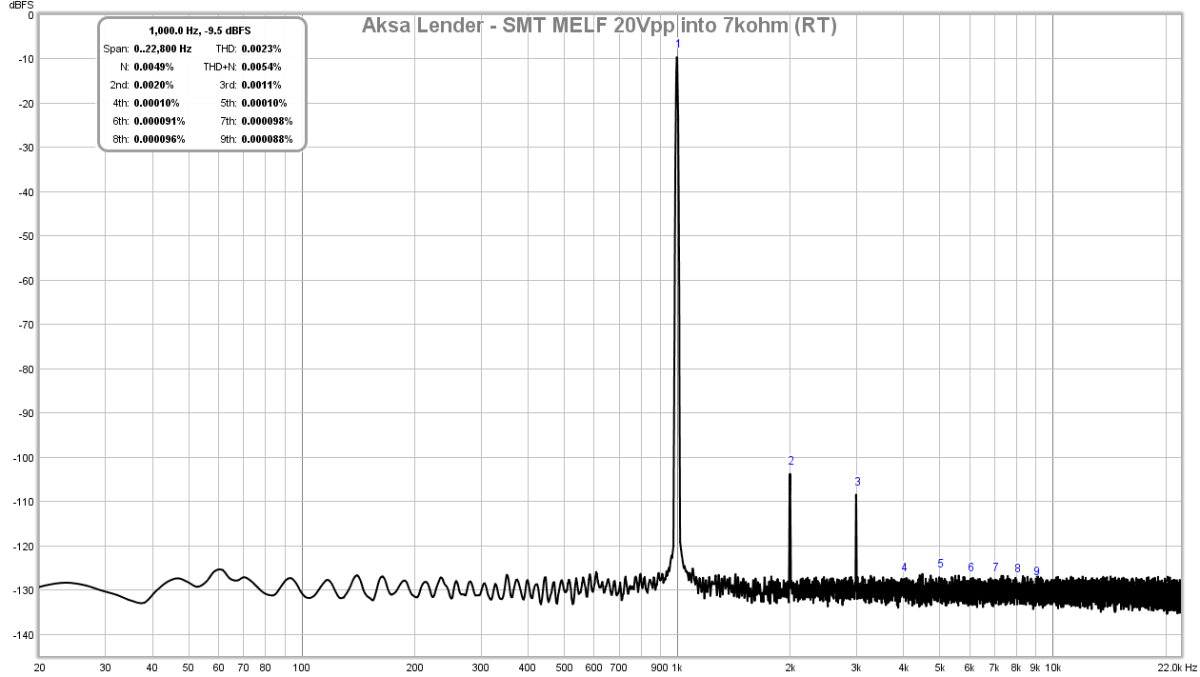
Here is the FFT for 51.4Vpp (a little more than what is needed to make 39w into 8ohms in the LuFo) at about 0.013% THD and very little higher harmonics:
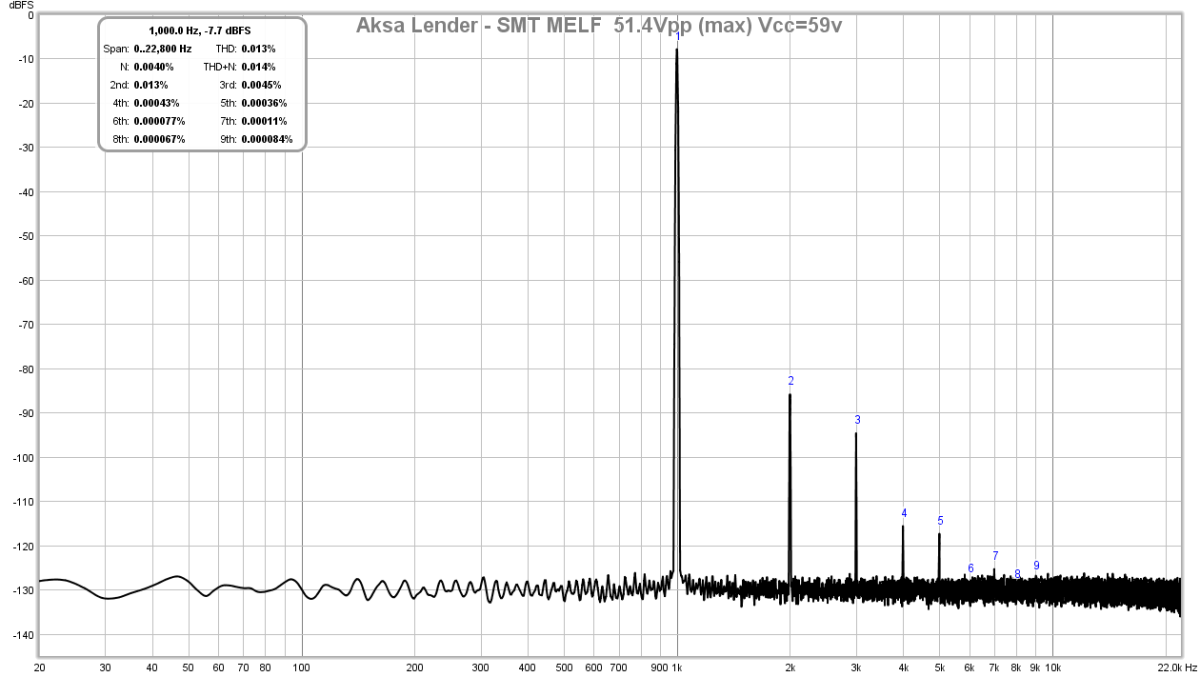
If anyone has FFT measurements of a Dreadnought to show, that would be great.
Here is the FFT for 51.4Vpp (a little more than what is needed to make 39w into 8ohms in the LuFo) at about 0.013% THD and very little higher harmonics:
If anyone has FFT measurements of a Dreadnought to show, that would be great.
Last edited:
Vunce is getting a head start on building the LuFo amp verification build. He has chosen an old Odyssey Stratos amp as the donor chassis. It has the size to handle the LuFo as a dual monoblock in single chassis. It’s going to be a monster with a 500VA trafo and two 8lb MOTs. Also two single rail SLB power supply boards. Probably an SFP will be thrown in for soft start duties as well. I suspect upwards of 70lbs when completed. 😀 Watch your back, Vunce!
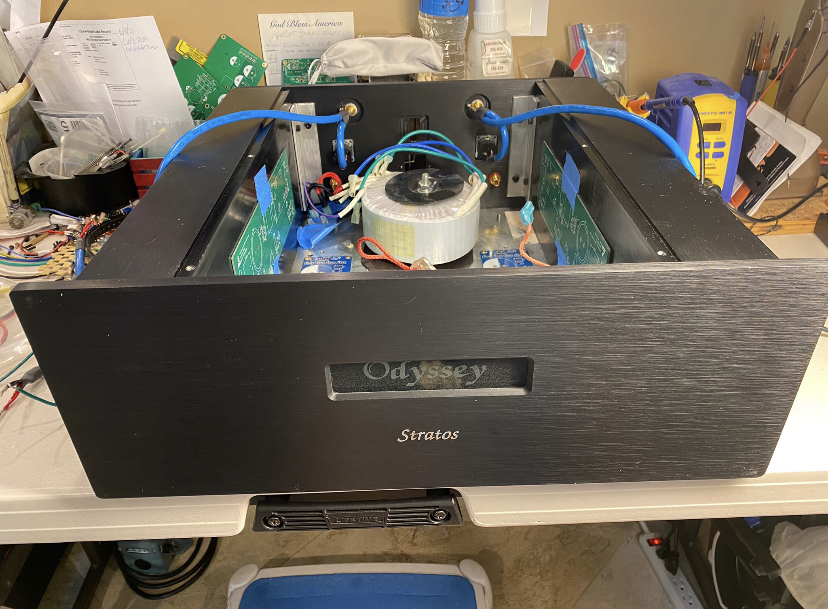
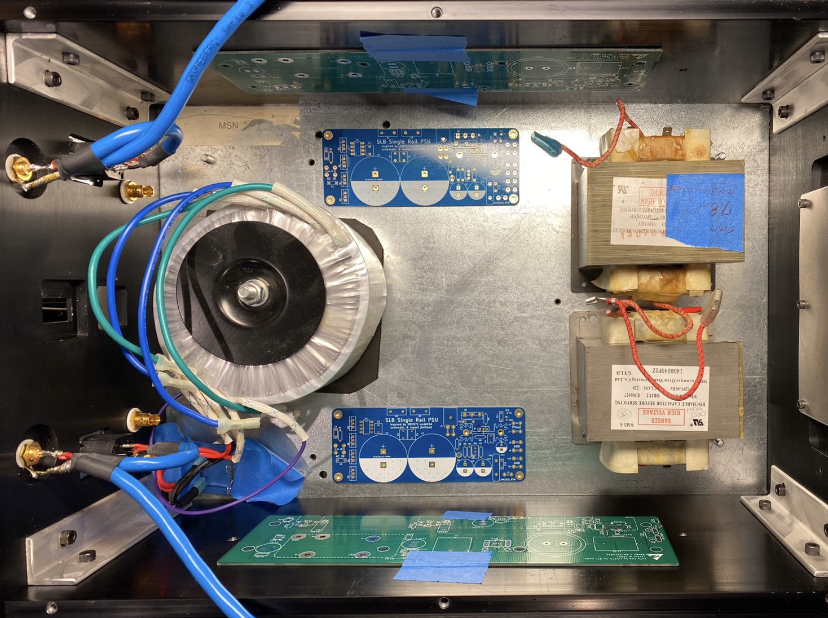

Attachments
I will be bench testing XRK's creation with a Kikusui PAN35-20 35V 20A power supply. I will be able to try 3A and 6A idle current settings. Don't drop one of these power supplies on your toe. Pictures will be posted when I have the bench up and running.
Hi WT,
I’ll send you the LuFo PCBs as soon as it gets here. Shouldn’t be more than another day or two. That PSU of yours should be fine - I assume it is a linear supply given the massiveness?
On my end, I will be building mine up as a pair of monoblocks. This is what I have in mind and about to place an order for this chassis: 160 mm W x 192mm H x 348mm D internal dimensions, 10kg (each).



I’ll send you the LuFo PCBs as soon as it gets here. Shouldn’t be more than another day or two. That PSU of yours should be fine - I assume it is a linear supply given the massiveness?
On my end, I will be building mine up as a pair of monoblocks. This is what I have in mind and about to place an order for this chassis: 160 mm W x 192mm H x 348mm D internal dimensions, 10kg (each).
Attachments
Yes it is a linear power supply. No hurry on the PCBs. Very busy summer for me with the day job and other stuff.
I have a duplicate of this chassis that may be suitable for some pretty decent power. It is about 3.5U tall, 400mm deep and has extra large fins. Internal space is at a premium for the serious iron needed for this project, but I think I can make it fit with a 600VA Antek transformer and a pair of MOT. Probably insufficient room for the Hammond 195T5, though.
Attachments
Hi TA,
That’s a nice chassis. Fitting a toroidal, two MOTs and a pair of SLBs would indeed be tight. What are the internal dimensions? Maybe have a separate chassis for the trafo and two SLBs like you did on the VFET amp?
Really nice work you did on the standalone dual SLB PSU chassis for the VFET, btw. For the LuFo, you could use a single 500VA 25v toroidal can use each secondary for a separate SLB.
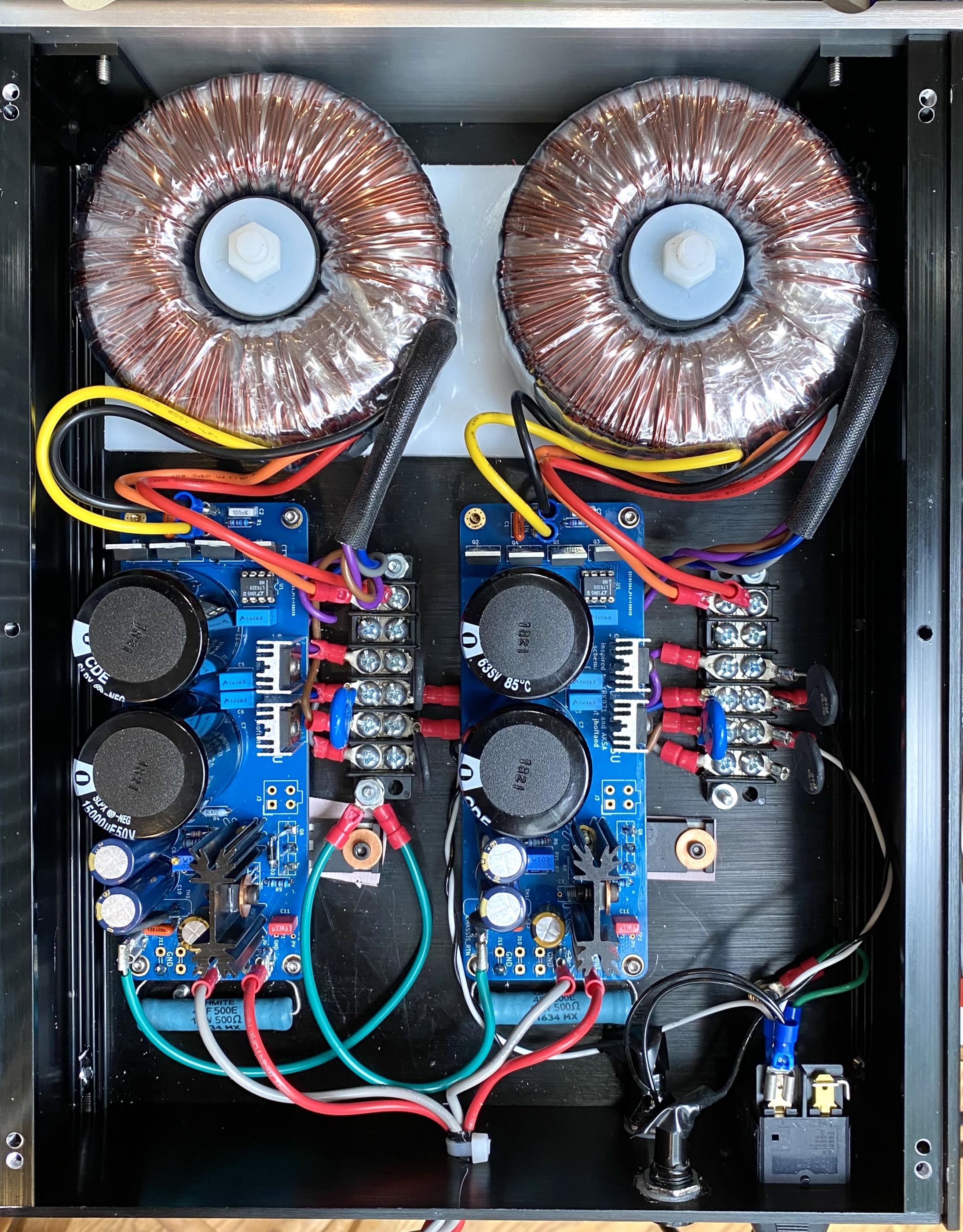
That’s a nice chassis. Fitting a toroidal, two MOTs and a pair of SLBs would indeed be tight. What are the internal dimensions? Maybe have a separate chassis for the trafo and two SLBs like you did on the VFET amp?
Really nice work you did on the standalone dual SLB PSU chassis for the VFET, btw. For the LuFo, you could use a single 500VA 25v toroidal can use each secondary for a separate SLB.
Last edited:
I have been discussing with Zman01 on how to deal with acquiring a suitable microwave oven transformer if you live in a country with 220vac mains. The primary windings on a MOT are generally too high of an impedance (longer thinner wire?) . There are plenty of YouTube videos that show how to remove and rewind your MOTs. If you have no interest in preserving the wire that is already there, diagonal cutters, chisel, hammer, maybe a screwdriver will pretty much make you dangerous enough to strip one clean and bare. The core is left and it is welded shut - but that core is like Gold in audio. One could find 14ga (1.6mm dia) copper magnet wire (insulated with varnish) and rewind yourself. Once the secondary had been removed, there is plenty of room. Winding 1.6mm dia copper wire is not easy, but the cost savings might be worth it. Also, it’s near impossible to find a 68mH 10A 0.5ohm DCR choke at a reasonable price.
I wonder if a lb of 14ga magnet wire (80ft) is enough? I think so because the primary I see on my MOT is a way smaller spool of wire than this.
14 AWG Gauge Enameled Copper Magnet Wire 1.0 lbs 80' Length 0.0655" 155C Red | eBay
BEST Microwave Oven Transformer-MOT Rewinding Tutorial - YouTube
How To: Rewind Microwave Oven Transformer, Trash To Treasure! - YouTube
Cheap 'N Easy ZVS Build 2/5: Rewinding a microwave oven transformer for an induction heater - YouTube
This is DIY audio right? We can’t expect everything to be premade for us. 🙂
I wonder if a lb of 14ga magnet wire (80ft) is enough? I think so because the primary I see on my MOT is a way smaller spool of wire than this.
14 AWG Gauge Enameled Copper Magnet Wire 1.0 lbs 80' Length 0.0655" 155C Red | eBay
BEST Microwave Oven Transformer-MOT Rewinding Tutorial - YouTube
How To: Rewind Microwave Oven Transformer, Trash To Treasure! - YouTube
Cheap 'N Easy ZVS Build 2/5: Rewinding a microwave oven transformer for an induction heater - YouTube
This is DIY audio right? We can’t expect everything to be premade for us. 🙂
Last edited:
MOT cores are not audio grade quality; they are for a totally different application.
Why build a nice class A amp and don't spend enough for one of it's most critical parts??
Aren't you guys aware of the fact that the quality of core material matters a lot??
Check tube amps and what is writen on this forum about the importance of output transformers and how they affect sound quality.
The quality of the choke for a LuFo amp is as important as output transformers are for tube amps.
You want DIY, but done right?
Then buy some good quality c-cores and 1.5 mm² home electrical wire (here in Europe the black insulated stuff) and wind your own quality choke!
This is a good one for US residents:
CD25x50x100 C-core - BRIDGEPORT MAGNETICS GROUP
Tune required DC resistance and inductance with the correct number of turns, applying the right air gap for 3 A DC current without core saturation.
C-cores are ideal for DIY as you don't have to (dis)assemble E's and I's, and tuning the air gap is easy.
Europeans: check SU90b c-cores which are also rated for some 600 watts.
When interested I have a friend willing to do some support.
Why build a nice class A amp and don't spend enough for one of it's most critical parts??
Aren't you guys aware of the fact that the quality of core material matters a lot??
Check tube amps and what is writen on this forum about the importance of output transformers and how they affect sound quality.
The quality of the choke for a LuFo amp is as important as output transformers are for tube amps.
You want DIY, but done right?
Then buy some good quality c-cores and 1.5 mm² home electrical wire (here in Europe the black insulated stuff) and wind your own quality choke!
This is a good one for US residents:
CD25x50x100 C-core - BRIDGEPORT MAGNETICS GROUP
Tune required DC resistance and inductance with the correct number of turns, applying the right air gap for 3 A DC current without core saturation.
C-cores are ideal for DIY as you don't have to (dis)assemble E's and I's, and tuning the air gap is easy.
Europeans: check SU90b c-cores which are also rated for some 600 watts.
When interested I have a friend willing to do some support.
Thanks for the tip on blank cores - that is a good option and folks should explore that. The price is reasonable at $38 ea. Just get some 14ga magnet wire and wind away. I know you are incredulous about MOTs - but they do work and sound great. In the US they are cheap and convenient.
You want DIY, but done right?
When interested I have a friend willing to do some support.
Thanks for posting. I have no experience of winding transformers and wouldn't know where to start or what to buy but I'm willing to give it a try. Do you have any pointers to good 'tutorials' on how to calculate what's needed and/or the practical aspects of the winding process. I know I could 'google' but would like to improve the signal to noise ratio.
Daanve,
Thanks for sharing this info, sounds interesting.
I would request you to open a separate thread on this, as the topic deserves a thread of its own, as it is likely that there will be a lot of discussion, learning and trying involved.
Having this discussion on the LuFo thread is likely to hamper the continuity here on LuFo developments, and on the other hand LuFo updates will break the continuity of inductor winding related discussions.
Thanks for sharing this info, sounds interesting.
I would request you to open a separate thread on this, as the topic deserves a thread of its own, as it is likely that there will be a lot of discussion, learning and trying involved.
Having this discussion on the LuFo thread is likely to hamper the continuity here on LuFo developments, and on the other hand LuFo updates will break the continuity of inductor winding related discussions.
Last edited:
I have a duplicate of this chassis that may be suitable for some pretty decent power. It is about 3.5U tall, 400mm deep and has extra large fins. Internal space is at a premium for the serious iron needed for this project, but I think I can make it fit with a 600VA Antek transformer and a pair of MOT. Probably insufficient room for the Hammond 195T5, though.
That's a nice chassis.
The Hammond 195T5 is a monster... I checked the specs and saw that it weights 14 lbs. Imagine it does fit and you install 2 units - that will be 28 lbs of iron there. 🙂
- Home
- Amplifiers
- Pass Labs
- LuFo Amp - 39w SE Class A from 28v Rail
